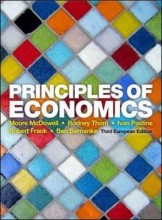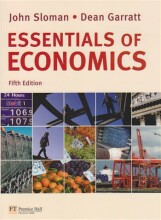Principles of Economics
18 important questions on Principles of Economics
Why does money have value?
- acceptibility
- legal tender
- relative scarcity
M 0
M 1
M 2
M 1 = Currency + checkable deposits
M 2 = M1 + near money (savings department)
Fractional reserve banking system
- Higher grades + faster learning
- Never study anything twice
- 100% sure, 100% understanding
The EMU has a fractional reserve banking system
- Banks create money through lending
Reserve Ratio formula
Checkable deposit liabilites
Formula excess reserves
Difference individual and commercial bank lending capacity
Money multiplier formula
Maximum checkable deposit creation D, is equal to
D = E x M
Demand for money reasons
2. To hold it as an asset (store of value)
What is the sum of total money demanded
Main determinant of the amount of money demanded for transactions is the level of ...
If the ECB raises the reserve ration then
- Amount of required reserves will go up
- banks will loss excess reserves
- dimish their ability to create money by lending or reduce checkable deposits and therefore the money supply, due to deficient reserves
Increasing the discount rate discourages commercial banks from obtaining additional reserves through borrowing from the central banks
Expansionary monetary policy and GDP --> Problem = unemployment and recession
2. Excess reserves increase
3. Money supply increases
4. Interest rate falls
5. Investment goes up
6. AD increases
7. Real GDP increases`
Restrictive monetary policy and GDP ---> problem = inflation
2. Excess reserve decrease
3. Money supply falls
4. Interest rate increases
5. Investment spending decreases
6. AD decreases
7. Inflation declines
Advantages of monetary policy
- Isolation from political pressures
--> monetary policy can be quickly altered and is subtler and more politcally neutral
Shortcoming of monetary ppolicy
---> ECB must recoginze and respond quickly to changes in economic activity
2. it takes time for monetary policy to work its way through to AD
3. Monetary policy suffers from cyclical assymmetry
The question on the page originate from the summary of the following study material:
- A unique study and practice tool
- Never study anything twice again
- Get the grades you hope for
- 100% sure, 100% understanding































